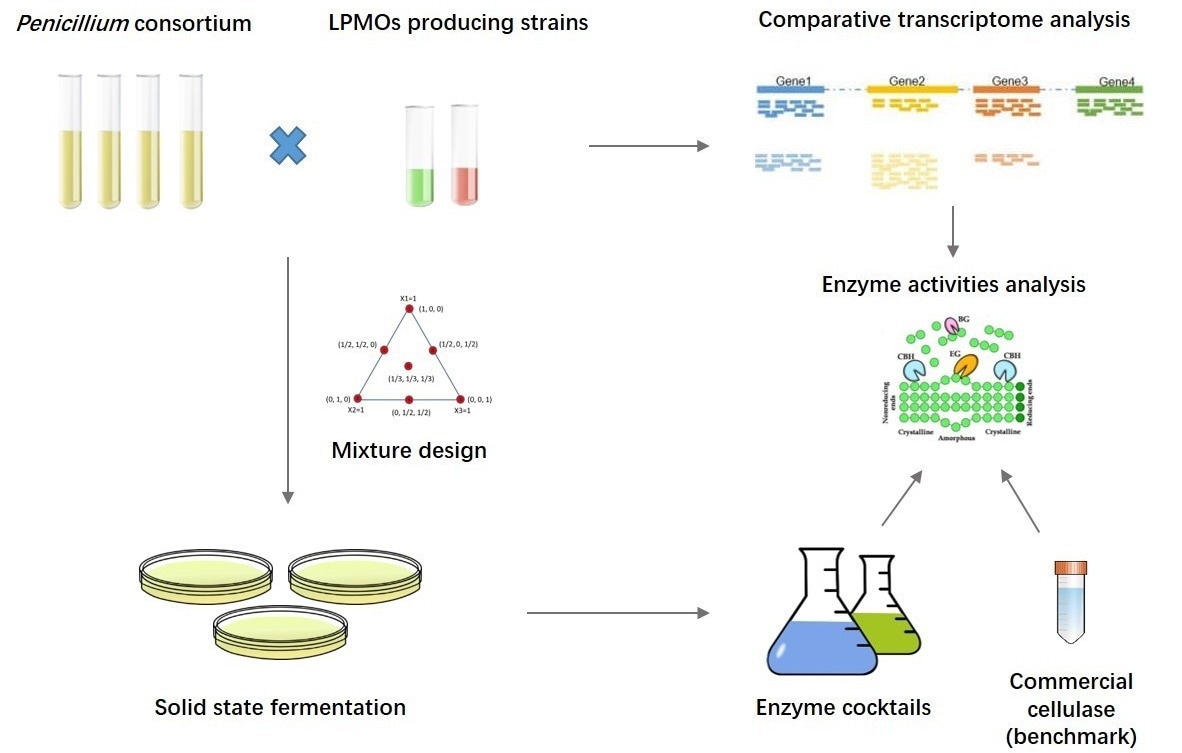Reviewed by Alex SmithOct 17 2022
The most common feedstock used to make bio-based fuels and products is lignocellulosic biomass. Enzyme “cocktails” are considered an effective method for allocating various specific activities in a matrix.

Efficient enzyme cocktail from Penicillium consortium. Image Credit: Yunzi Hu
Recently, scientists working under the direction of Prof. Wei Qi from the Chinese Academy of Sciences’ Guangzhou Institute of Energy Conversion reported the creation of an effective cellulase “cocktail” by co-cultivating multiple Penicillium strains with some that produce lytic polysaccharide monooxygenases (LPMOs), resulting in an excellent hydrolysis yield of pretreated poplar materials.
On September 22nd, 2022, the study was published in the Chemical Engineering Journal.
Fermentation of fungal consortium is an effective approach to improve the yield of enzymes and coordinate the proportion of enzyme system through the synergistic effect of mutual benefit and symbiosis among multiple strains.”
Wei Qi, Study Corresponding Author and Professor, Guangzhou Institute of Energy Conversion, Chinese Academy of Sciences
Using a mixture design methodology, the researchers looked into the co-fermentation of four different Penicillium strains with Thermoascus aurantiacus and Neurospora crassa and conducted a comparative examination of the enzyme components, activity, and strain transcriptome using commercial cellulase as a benchmark.
The team discovered that the Penicillium consortium’s “cocktail” of enzymes had a superior expression on a variety of Glycoside Hydrolases (GHs), Glycosyl Transferases (GTs), Polysaccharide Lyases (PLs), and other auxiliary enzymes, speeding up the breakdown of chemical bonds in the hemicellulose and cellulose fractions.
The researchers also created a unique formulation by mixing a fermented enzyme cocktail with commercial cellulase in the right ratio to enhance synergistic enzyme effects. With an increase of 32% compared to employing commercial cellulase alone, the pretreated poplar was digested to liberate glucose at an 88% yield.
Prof. Qi added, “The proposed fungal consortium and enzyme formulation have good potent to be applied in industry as a green and powerful tool, which can enhance lignocellulose biodegradation and consequently reduce enzyme cost. It is important for sustainable development of agriculture and forest wastes biorefinery, as well as the production of biofuels and materials.”
Journal Reference:
Liang, C., et al. (2022) Enhancement of an efficient enzyme cocktail from Penicillium consortium on biodegradation of pretreated poplar. Chemical Engineering Journal. doi:10.1016/j.cej.2022.139352